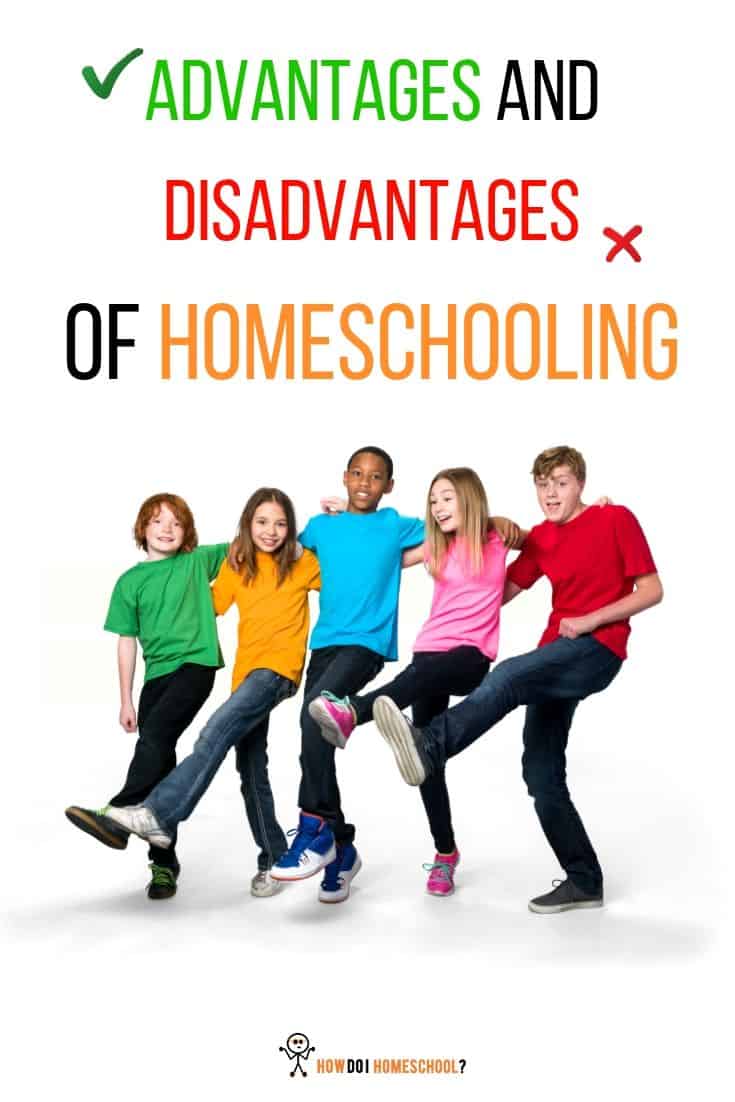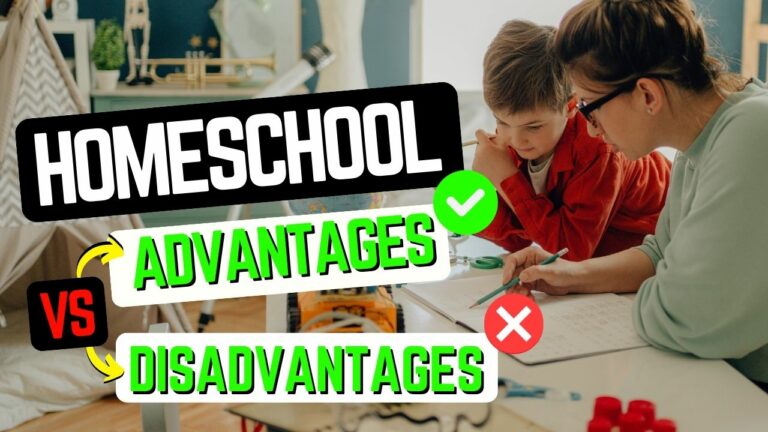In the world of education, the debate surrounding homeschooling can be as lively as a classroom full of spirited students. As we embark on this intellectual journey exploring the advantages and disadvantages of homeschooling, we invite you to put on your thinking cap and join us in deciphering whether the home is truly where the heart of education lies. So, buckle up, grab your pencils, and get ready to navigate the winding roads of homeschooling!

I hope you enjoy reading this blog post. If you want to do my course on how to homeschool, click here.
Advantages of Homeschooling
Homeschooling, the path less traveled in education, offers a myriad of advantages that ignite a flame of enthusiasm for learning.
First and foremost, it provides unparalleled flexibility, allowing families to tailor curriculum and schedules to the unique needs and interests of their children.
By escaping the rigid structure of traditional schooling, homeschoolers can embark on personalized educational journeys, unlocking their full potential.
Moreover, the one-on-one attention in a homeschooling environment fosters deep connections between parents and children, creating a nurturing atmosphere where curiosity thrives.
With the freedom to explore beyond textbooks and embrace experiential learning, homeschooling unlocks a world of creativity and adaptability.
By breaking the mold and embracing the extraordinary, homeschooling cultivates independent thinkers ready to conquer the ever-evolving challenges of the world.
Let’s look into the advantages of homeschooling further below.
Social Advantages of Homeschooling
There are many social advantages when it comes to home eduction. These are that there is less:
- guidance from bad influences like negative peers,
- exposure to drugs, smoking, alcohol, and bullying,
- sexual pressure to become a sex idol,
- exposure to sexting and pornography, and
- of a judgemental environment which aids learning
And there’s more:
- guidance from good influences like parents,
- chances to get to know the community,
- opportunity to interact with people of other ages, which means you are more used to talking to them when you graduate school,
- time for parents to spend with their kids, and
- time to spend on lobbying political groups, reading the Bible, and thinking through deep and controversial issues of our day
Homeschoolers are also often better behaved due to the aforementioned points.
Religious Advantages
A big drawcard of homeschooling is the time parents spend with their kids.
As a Christian, you have more time to disciple and train your children.
You spend less time doing damage control due to conflicting ideas and attitudes to Christianity from schools, teachers, peers, and peers’ parents.
You can explain your religious perspective more thoroughly instead of having it explained by whichever teacher your child’s year group happens to have.
Furthermore, unlike a lot of public schools that only promote religious humanism, you can compare popular religions to the Christian religion and inform young minds the way you want to.
That is, in a homeschool situation, you can teach children without being forced to give lip service to politically correct lobby groups or government bodies.
Physical Advantages
There are also a lot of practical advantages of homeschooling, such as:
- because homeschoolers have more time to sleep, they can concentrate on their work more as they’re not as tired as their school peers who are getting less sleep. This is a particularly salient point for teenagers whose body clock needs them to sleep in until 9 am and stay up late,
- better opportunities to do an elite sport,
- being able to study anywhere at any time, and
- choosing when to start formal schooling (i.e. if your child is developmentally delayed or has another reason why he/she should start formal schooling later).
Relational Advantages
School can be a tiring process, with children coming home in an irritable mood at the end of the day.
As such, homeschools provide a more flexible, slower-paced environment. This means children are less worn out at the end of the day and more inclined to interact positively with their parents.
Additionally, homeschools offer:
- a less peer-oriented environment and a more family-oriented environment. This means family bonding is stronger and
- more time to improve relationships. This results in siblings who are often best friends with each other and their parents.

Mental Advantages
For many, homeschooling can be an exciting time where parents learn things alongside their children.
This creates lifelong learners (the parents!). Often children have lower anxiety levels as they have more contact with their parents’ love.
(This is probably why so many children with special needs homeschool – that is, lower anxiety levels which leads to better learning).
In school, you might find children who suppress their abilities to fit in with the peer group around them.
In a homeschool, academic prowess is encouraged, and genius is more readily brought to the surface thanks to encouraging parents and siblings.
Academic Advantages
Another benefit of education in the homeschooling environment is the academic advantages it has to offer. These include:
- getting work done in three hours or less on average,
- children becoming self-learners,
- homeschoolers becoming great readers,
- the ability to do subjects you might not be able to/might not be allowed to do in school,
- more motivation as children are doing less busywork and have more opportunity to pick subjects they enjoy. Parents can cross out the busywork in the curriculum and point children to work that will be more helpful.
- no exams. I’ve read a lot that suggests exams are often not helpful and embitter children to learning by raising anxiety levels. When exams are present, it seems children tend to learn with the aim of getting a high mark. When exams are not present, children learn for the fun of learning. When children learn for the fun of learning, they’ll take in more, as stress hormones don’t inhibit their brains. There’s a lot of talk that flies around every time children sit NAPLAN, as many people suspect the test isn’t for the children or families but for the government. (Read this experts article on why he won’t let his kids sit NAPLAN).
- homeschoolers can better dedicate themselves to an entrepreneurial venture. Getting an early start means they can make entrepreneurial mistakes at home and use the pocket money they’ve earned to further their venture.
Practical Advantages
Some practical advantages of homeschooling include:
- parents can travel if they homeschool (called travelschooling or roadschooling)
- the ability to holiday outside of school days so you miss the school rush, and
- you can get a cheaper education than an expensive private school (although probably similar to or more than the cost of a public school.)
Homeschooled children also become more handy in the garden, kitchen and during everyday events and activities.
Special Needs Advantages
Homeschooling is self-paced and offers a slower, more flexible environment for special needs students.
Among other things, this means:
- children with disabilities can attend medical appointments without falling behind. It also means they can catch up on any schoolwork they missed when feeling better. They can also proceed at a slower pace than in a school. This means they don’t feel silly or more disabled by peers who tease them for their disability.
- children with autism can have a quieter, more familiar environment in which to work. This means they’re not distracted constantly and can get on with schoolwork without feeling overly anxious as is often the case in school.
Homeschooling can also offer children with gifts an opportunity to work faster than school offers, meaning they can develop their gifts instead of suppressing them, as often happens in schools. While some schools have special ‘gifted’ classes, many gifted children find even these are not enough and long to work at a faster pace all the time.
Disadvantages of Homeschooling
Homeschooling, compared to attending a mainstream school, is often scrutinized for its potential impact on a child’s development. This article delves into the advantages and disadvantages of homeschooling, aiming to shed light on the various factors that shape a child’s educational journey. By exploring both sides of the coin, we strive to unravel the complexities and nuances of this educational alternative. So, let’s dive in and examine whether homeschooling truly holds any disadvantages when it comes to a child’s development.
So, can homeschooling be a hindrance to a child’s development compared to attending a mainstream school?
Well, the answer is a resounding “Yes and no.”
Allow me to elucidate this paradox.
On the one hand, homeschooling is like a versatile tool, much like a Swiss army knife, capable of being wielded with precision and finesse.
When utilized skillfully, it can provide a nurturing environment, tailor-made education, and individualized attention, all of which can foster the blossoming of a young mind. So, in these instances, homeschooling is a delightful thing.
On the other hand, let’s not overlook the fact that mainstream schools have their own charms, or rather, their own pitfalls.
Picture this: underfunded institutions that resemble an artist’s rendition of a minimalist dystopia, social dynamics dictated by governmental control, and a buffet of peer pressure served on a silver platter.
Sadly, these aspects often dilute the educational experience and hamper the optimal development of children.
Disadvantages of Homeschooling Expanded
Disadvantages of homeschooling can be broken down into a few categories: social, technological, and spiritual aspects.
Social Disadvantages
While most parents considering homeschooling are extremely versed on the dangers of failing to socialize children, some think socialization can be dispensed with.
They believe nothing bad will result from failing to socialize children.
Many of these folks also believe they can neglect their children and it won’t affect them…or they just don’t care…or they’re lazy.
For parents who are ignorant of the necessity of socialization
These parents may innocently fail to recognize their child’s social needs.
Whether their mistake is innocent or not, it may lead to children who resent their parents for choosing to home-educate (I’ve seen this a lot among homeschool graduates).
It might also cause home education graduates who struggle to fit in with society immediately after their introduction into the ‘real world’ (again, I’ve personally observed this a few times).
This culture shock can have consequences too (failure to be successful in job hunting or career pathways; difficulty socializing with others; difficulty in performing simple day-to-day tasks everyone else knows about).
For parents who are introverted and don’t value socialization
Homeschoolers can have ‘introverted’ parents who can’t imagine anything worse than spending time with others in social situations.
They sometimes assume their children will be similarly inclined, and so they keep them from social situations to the detriment of their children.
Very occasionally, some homeschooling families – like some school families – abuse their children and don’t care if their child is adversely affected by lack of socialization.
This is extremely sad.
Unfortunately, families like this seem to get a disproportionate amount of media attention.
Indeed, every time a homeschooling family abuses or neglects their children, it tends to get into the papers (especially if it’s a Christian family as the media don’t seem to be in favor of Christianity these days – see Israel Folau as an example).
Still, another very, very small subset of parents has every intention of abusing and controlling their children.
So they sign up to home-educate them.
Again, this gives homeschooling a bad name.
Technological Disadvantages
When parents aren’t aware of the negative effects of technology overuse, they can sabotage their children’s brains from a young age. (For example, with unrestrained access to detrimental video games.)
For example, I know a two-year-old boy who spends almost no time in front of a screen.
He is noticeably different from many two-year-olds in that he isn’t squirming with technology withdrawals, as some children are used to having as much screen time as they desire.
It makes me sad when children don’t want to play with you.
Instead, they want to get lost in the fake online fantasy world giving them everything they want – so long as they’re connected.
However, I don’t think it’s giving children what they need to learn properly.
Note: Some say homeschoolers miss out on all the great equipment schools have. However, schools also miss out on the great extracurricular activities and chances home education offers due to not having to be tethered to the school environment for six or seven hours a day.
Spiritual Aspects
While many homeschooling parents are great at feeding their children a constant supply of the gospel, some get side-tracked and become legalistic.
They follow rules and formulas like the Pharisees to get their children into heaven.
The Bible says we are utterly sinful, and we can only be saved through the atoning work of Jesus Christ, our Saviour.
He alone is good enough to save us from our sins and give us eternal life with God.
Sadly, I see too much legalism in homeschooled families.
One example I can think of was a family whose parents wouldn’t let them socialize with any non-Christians as the parents thought unbelievers would stain their children.
This led to a restrictive life and failed to take into account the sinfulness that is present in our own hearts.
The daughter recounted how her father shouted at her uncontrollably when he found his 16-year-old listening to a tame pop song.
Of course, the hypocritical nature of her father was immediately evident in that he was being angry and sinful himself.
The long and short of it is that legalism can ruin Christian families.
We need freedom in Christ accompanied by prayer and Bible reading.
This is because Satan walks around like a roaring lion, ready to devour.
But God can be a hedge all around us if we ask him. The Bible is also the most useful guide to life we will find.
Subscribe to How to Homeschool (my Youtube channel!)
Have you caught the homeschooling bug?
Eager to delve deeper into the realm of unconventional education?
Well, my curious comrades, rejoice!
There are splendid avenues awaiting your exploration.
Firstly, hop on over to my YouTube channel, where a treasure trove of homeschooling wisdom awaits. From practical tips to delightful anecdotes, I unravel the mysteries of homeschooling with a touch of wit and wisdom.
Subscribe, hit that notification bell, and embark on an enlightening journey with me.
Enroll in the Homeschool Parenting Program
For those yearning for a comprehensive guide to homeschooling, look no further than my Homeschool Parenting Program.
This illustrious online course will equip you with the knowledge, strategies, and confidence to navigate the exhilarating world of homeschooling like a seasoned pro.
Enroll today and unlock the door to extraordinary educational possibilities.
Conclusion
While some mistakenly believe homeschooling is an inferior form of education, this isn’t supported by the evidence and what I’ve seen. I’ve been so impressed with homeschool graduates. They seem willing to interact with people of all ages using intelligent and empathetic conversation. These days it is rare to find such informed people – but I have been able to find them often among home-educated students.
If you want to read about my own homeschooling experience (I’m a homeschool graduate), you can go to this link. Hope this was helpful. If you want any further clarification (or I’ve misunderstood a point, and you want to clarify it), leave me a comment below. Thanks.




Rebbecca, it’s great that you said that one of the benefits of homeschooling is you get to bring up your child in a family-oriented environment. That means I could protect my child from other people who could be a bad influence on them. Society, nowadays, is becoming more and more liberated, and I want my child to be conservative, chaste, and kind. With that in mind, I’ll definitely consider homeschooling. Thanks.
Great read!!! Thanks for sharing such a great blog.